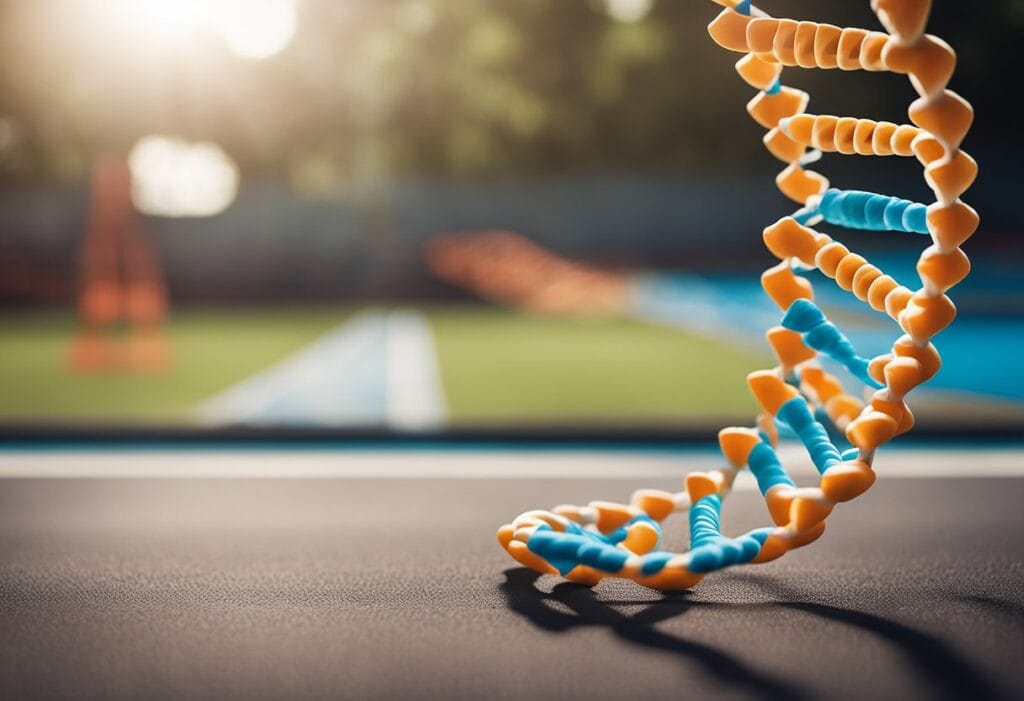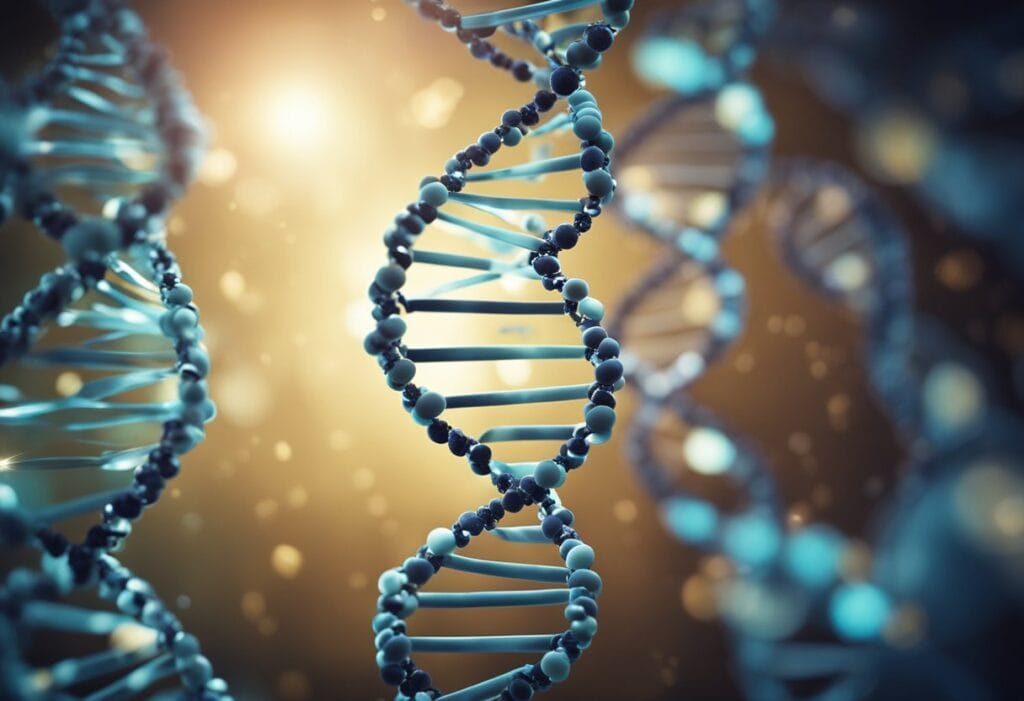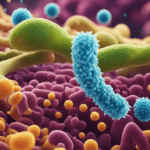Genetics plays a significant role in determining our health and fitness. Our genes, which are inherited from our parents, can influence our susceptibility to various diseases and conditions, as well as our athletic abilities and response to exercise. Understanding the role of genetics in health and fitness can help us make informed decisions about our lifestyle choices and develop personalized strategies for optimizing our well-being.

The genetic foundations of health and fitness are complex and multifactorial. While some conditions, such as sickle cell anemia and Huntington’s disease, are caused by mutations in a single gene, most health and fitness traits are influenced by multiple genes and environmental factors. For example, genes can affect our metabolism, body composition, and risk of developing chronic diseases such as diabetes, heart disease, and cancer. In addition, our genes can influence our athletic performance and response to exercise, including our endurance, strength, and recovery time.
Understanding how our genes influence our health and fitness can help us develop personalized strategies for optimizing our well-being. By identifying our genetic predispositions and risk factors, we can make informed decisions about our diet, exercise, and lifestyle choices. We can also use genetic testing and personalized coaching to develop customized exercise programs and nutrition plans that are tailored to our unique genetic profile. Ultimately, by harnessing the power of genetics, we can improve our health and fitness and enhance our quality of life.
Key Takeaways
- Genetics plays a significant role in determining our health and fitness.
- Our genes can influence our susceptibility to various diseases and conditions, as well as our athletic abilities and response to exercise.
- Understanding how our genes influence our health and fitness can help us develop personalized strategies for optimizing our well-being.
Genetic Foundations of Health and Fitness
As we delve deeper into the world of health and fitness, it becomes increasingly evident that our genes play a crucial role in determining our physical abilities and overall well-being. Understanding the role of genetics and genomics in health and fitness is essential for individuals looking to optimize their fitness routines and lead a healthy lifestyle.
Understanding Genetics and Genomics
Genetics is the study of how traits are passed down from one generation to the next through genes. Genomics, on the other hand, is the study of the entire genome, including all of the genes, their functions, and interactions with each other and the environment.
Our genes determine our physical characteristics, such as eye color and height, but they also play a significant role in our health and fitness. Genetic variations, such as alleles, can affect our susceptibility to certain diseases and our ability to build muscle or endurance.
The Impact of Alleles and Genotypes on Fitness
Alleles are different versions of a gene that can affect the expression of a trait. For example, there are different alleles of the ACTN3 gene that affect muscle fiber composition and athletic performance.
Genotypes, which refer to the combination of alleles, can also impact fitness. For instance, individuals with two copies of the “C” allele of the FTO gene are more likely to be obese than those with two copies of the “T” allele.
The heritability of certain traits, such as height and body mass index (BMI), can also be influenced by genetic factors. However, it’s important to note that genetics is not the only factor that determines our physical abilities and health outcomes. Environmental factors, such as diet and exercise, also play a crucial role.
In conclusion, genetics and genomics are essential components of health and fitness. Understanding the impact of genetic variations, such as alleles and genotypes, can help individuals tailor their fitness routines to optimize their physical abilities and overall health.
Influence of Genetics on Exercise Response
Exercise response is a complex trait that is influenced by both genetic and environmental factors. While the role of environmental factors such as exercise training is well established, recent research has highlighted the importance of genetic factors in determining individual differences in exercise response.
Genetic Determinants of Muscle Strength and Mass
Muscle strength and mass are critical components of physical fitness and are strongly influenced by genetic factors. Several genes have been identified that are associated with muscle strength and mass, including the ACTN3 gene, which is involved in muscle fiber composition. Individuals with a specific variant of this gene have been shown to have increased muscle strength and power, making them more suited for power sports such as weightlifting and sprinting.
Other genes that have been associated with muscle strength and mass include the myostatin gene, which regulates muscle growth, and the IGF-1 gene, which is involved in muscle development and repair. Variants of these genes have been shown to affect muscle strength and mass, and may play a role in determining individual differences in response to exercise training.
Cardiorespiratory Fitness and Genetic Factors
Cardiorespiratory fitness is another key component of physical fitness, and is also strongly influenced by genetic factors. Several genes have been identified that are associated with cardiorespiratory fitness, including the ACE gene, which regulates blood pressure and is involved in cardiovascular function.
Variants of the ACE gene have been shown to affect cardiorespiratory fitness, with some variants associated with increased fitness and others associated with decreased fitness. Other genes that have been associated with cardiorespiratory fitness include the PPARGC1A gene, which is involved in energy metabolism and mitochondrial function, and the HIF1A gene, which regulates oxygen transport and utilization.
While genetic factors play an important role in determining individual differences in exercise response, it is important to note that environmental factors such as exercise training also play a critical role. Exercise training can modify gene expression and alter the response to exercise, highlighting the importance of a balanced approach that takes into account both genetic and environmental factors.
Genetics and Athletic Performance

As we know, athletic performance is influenced by a variety of factors, including training, nutrition, and genetics. In this section, we will explore the role of genetics in athletic performance and how genetic testing can be used to enhance training and identify elite athletes.
Elite Athletes and Genetic Advantages
Research has shown that genetics plays a significant role in determining an individual’s athletic potential. Some individuals are born with genetic advantages that allow them to excel in certain sports. For example, a study published in the journal Nature Reviews Genetics found that certain genetic variations are associated with increased endurance, strength, and power.
However, it’s important to note that genetics is not the only factor that determines athletic success. Hard work, dedication, and proper training are also essential. In fact, many elite athletes have achieved success despite not having a genetic advantage.
Trainability and Genetic Testing in Sports
One area where genetic testing may be useful is in identifying an individual’s trainability. Genetic testing can provide information about an individual’s muscle fiber type, which can be used to tailor training programs to their specific needs.
Additionally, genetic testing may be useful in identifying elite athletes. Certain genetic variations have been found to be more common in elite athletes than in the general population. However, it’s important to note that genetic testing alone is not enough to identify an elite athlete. Other factors, such as performance in competition, must also be taken into account.
In conclusion, genetics plays a significant role in athletic performance, and genetic testing may be useful in identifying an individual’s trainability and potential for success in certain sports. However, it’s important to remember that genetics is just one factor that determines athletic success, and hard work and dedication are essential for achieving one’s full potential.
Personalized Fitness and Health Strategies

As we all know, not all exercise programs or diets work for everyone. This is because we all have unique genetic profiles that influence our response to different types of exercise and nutrition. By taking a personalized approach to fitness and health, we can optimize our performance outcomes and overall well-being.
Tailoring Exercise Programs to Genetic Profiles
One of the most exciting applications of genetics in fitness is the ability to tailor exercise programs to an individual’s genetic profile. By analyzing our DNA, we can identify genetic variations that influence factors such as muscle fiber type, endurance capacity, and injury risk. This information can then be used to design a specific training program that maximizes our strengths and minimizes our weaknesses.
For example, individuals with a genetic predisposition to power-based activities may benefit from a strength training program that emphasizes heavy lifting and explosive movements. On the other hand, those with a genetic predisposition to endurance-based activities may benefit from a training program that emphasizes long, steady-state cardio sessions.
Diet and Lifestyle Considerations for Optimal Health
In addition to exercise, genetics also play a role in our dietary and lifestyle needs. By understanding our genetic profile, we can identify specific nutrient needs and dietary restrictions that may impact our health and performance outcomes.
For example, individuals with a genetic predisposition to lactose intolerance may need to avoid dairy products or supplement with lactase to prevent digestive issues. Similarly, those with a genetic predisposition to celiac disease may need to avoid gluten-containing foods to prevent autoimmune reactions.
Lifestyle factors such as sleep, stress, and recovery also play a critical role in our overall health and performance outcomes. By understanding our genetic profile, we can identify specific lifestyle factors that may impact our ability to recover from exercise and manage stress.
In conclusion, personalized fitness and health strategies based on our genetic profiles can help us optimize our performance outcomes and overall well-being. By tailoring our exercise programs, diets, and lifestyles to our unique genetic needs, we can achieve our fitness and health goals more efficiently and effectively.
The Future of Genetics in Health and Fitness

As the field of genomics continues to advance, we can expect to see more applications of genetic information in the realm of health and fitness. Here, we discuss some of the potential future developments in this field.
Advancements in Exercise Genomics
Exercise genomics is a growing field that seeks to understand how genetic variations affect an individual’s response to exercise. With the help of new technologies, such as CRISPR-Cas9 gene editing, we may soon be able to modify genes that affect muscle growth or endurance, potentially leading to improved athletic performance.
At the same time, we must be cautious about the ethical implications of such interventions. Genetic modifications could be used to create “designer athletes,” raising concerns about fairness and safety. Additionally, we must consider the potential long-term effects of such modifications on an individual’s health.
Ethical and Practical Implications of Genetic Information
As genetic testing becomes more widely available, we must also consider the ethical and practical implications of such information. On the one hand, genetic testing can provide valuable information about an individual’s risk for certain diseases, allowing for early intervention and prevention. On the other hand, genetic information can also be used to discriminate against individuals in areas such as employment and insurance.
We must also consider the impact of genetic information on an individual’s quality of life. Knowing that one is at a high risk for a particular disease could lead to anxiety and stress. Additionally, genetic information could be used to make decisions about reproductive choices, raising questions about autonomy and consent.
In conclusion, while genetics has the potential to revolutionize the field of health and fitness, we must approach these developments with caution. We must consider the ethical and practical implications of genetic information and ensure that these technologies are used in a safe and responsible manner.










